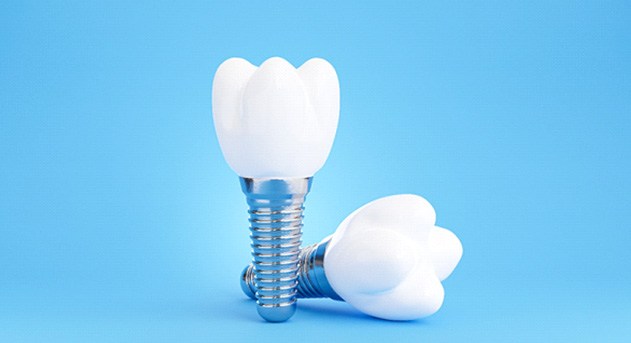Dental Implants – Lakewood, CO
Rebuild Your Smile to the Fullest

When it comes to replacing missing teeth, there’s only one option that feels just as natural as your old pearly whites – dental implants. Instead of just recreating the crowns of teeth, dental implants restore the entire tooth structure. Here at Dedicated Dentistry, Dr. Tavi Henry partners with the best dental implant specialists in the Lakewood area to streamline your treatment experience. To get started, give our friendly team a call to discuss tooh replacement with dental implants in Lakewood, CO!
Why Choose Dedicated Dentistry for Dental Implants?
- Partners with Local Experts for Dental Implant Surgery
- Digital Dental Impressions Without the Mess
- Gentle Dentist & Team Who Put Your Comfort First
What Are Dental Implants?
A dental implant is an artificial tooth root that is usually made from titanium. This material allows the implant post to naturally fuse with the bone and tissue after it has been surgically positioned in the jaw. The implant becomes embedded in your jawbone like the roots of your natural teeth, enabling it to support your restoration for years or even decades to come.
The 4-Step Dental Implant Process

- Consultation – The first step in rebuilding your smile is attending a consultation. Dr. Henry will examine your teeth, gums, and jawbone to make sure you’re a good candidate for dental implants.
- Surgery – When it’s time to have the implants surgically placed in your jaw, you’re referred to a local specialist to ensure the highest quality of care.
- Osseointegration – Over the next four to six months, your jawbone will grow around the implant posts until they are essentially a part of your body.
- Placing the final restoration(s) – Once your implants have fully integrated with your jaw, Dr. Henry will secure your crown, bridge, or denture onto your implants.
Benefits of Dental Implants

Today, dental implants are highly popular as tooth replacements. Dentists even place over 500,000 of them yearly! This popularity, though, should be unsurprising – implants offer many unique perks that dentures and dental bridges can’t match. As a result, they have the potential to improve your quality of life greatly. If you want to learn more about the benefits of dental implants, we at Dedicated Dentistry will happily oblige. Just keep reading, or book a consultation to hear the details in person.
Day-to-Day Benefits

As you’d expect, the most noticeable implant upsides are the day-to-day ones. These typically include the following:
- A Gorgeous Grin – Because they’re capped with dental crowns, implants look beautiful and blend seamlessly with surrounding teeth. They’ll thus restore your smile without seeming unnatural or drawing unwanted attention.
- Boosted Confidence – Patients often feel more confident once implants fill their smile gaps. From there, they can experience an improved body image and reduced anxiety. These things will make socializing with friends and family much more enjoyable and less stressful.
- Easier Eating – Implants fuse with your jawbone, restoring much of your bite force. The result is an improved ability to eat your favorite tough foods.
- Low Maintenance – Unlike dentures or bridges, implants don’t require special maintenance. You can clean them just as you would natural teeth – using twice-daily brushing and once-daily flossing.
Health Benefits

Aside from their day-to-day benefits, implants also have other kinds. Notable among them are the health benefits. In particular, these latter perks are:
- A Cleaner Mouth – Unfilled smile gaps serve as breeding spots for harmful oral bacteria. The result is an increased risk of oral health issues like gum disease. However, implants fill these spaces and make teeth cleaning easier. They’d then make severe dental problems less likely.
- A More Nutritious Diet – Unchecked tooth loss causes your jawbone to erode, eventually leading to facial collapse. On the other hand, implants can stimulate your jawbone to prevent said erosion.
- Nearby Tooth Support – Aside from other effects, smile gaps can cause still-remaining teeth to tilt and fall out. Implants, though, fill these gaps and stabilize your other pearly whites.
- No Sensitivity – Implants don’t rub against other teeth or gum tissue, so they don’t irritate your various mouth tissues.
Long-term Benefits

Perhaps its implants’ long-term benefits set them apart more than the other kinds. These are:
- High Success Rate – When properly maintained, implants rarely fail after placement. It’s to the point that their ten-year success rate is over 95%!
- Long-Lived Results – The average dental implant has a 15–20-year lifespan. When given proper care, though, one can last 30 years or even longer. That means an implant could potentially work for the rest of your life.
- Cost-Effective Care – In light of their success and longevity, implants can save you money in the long run. After all, they usually don’t require much in the way of replacement or repair fees. The same isn’t true of dentures and bridges, which only last 5-7 years on average and need regular follow-up care.
Who Dental Implants Can Help

Out of all the types of tooth replacements available today, dental implants are by far the most versatile. As long as you have generally good oral and overall health and a strong jawbone, you’re probably a good dental implant candidate. This solution can bring back your full grin no matter how large the gaps may be. Depending on the number of teeth you’ve lost, Dr. Henry can plan out your treatment accordingly.
Missing One Tooth

A single dental implant can be vertically inserted into the space where a missing tooth’s roots used to be. Then, we can secure a custom dental crown on top to flawlessly recreate your tooth without compromising any of your remaining dental structure.
Missing Multiple Teeth

Instead of fitting a dental bridge over your natural teeth, we can place it over two implants that have been positioned at either end of the gap. For several non-consecutive missing teeth, a small number of implants can provide enough support for a partial denture.
Missing All of Your Teeth

Even if you’ve lost all of your teeth on your upper and/or lower arch, dental implants can give you a complete smile again. In most cases, it takes somewhere between four and eight implants to anchor a full denture that always stays in place no matter what you’re eating.
Understanding the Cost of Dental Implants

It’s best to learn dental implants’ price before you commit to them. You’ll know whether they fit your budget that way. Still, the cost of dental implants does vary by patient. You need to consult Dr. Henry for a precise estimate. From there, our office will strive to make your implants more affordable. To be specific, we’ll walk you through treatment’s pricing factors and payment options. Please keep reading or call our office to learn more.
Preliminary Treatments & Dental Implant Surgery

Your mouth may need extra oral care before an implant surgery. These services can range from bone grafts and gum disease therapy to tooth extractions. Should you require such procedures, the cost of your care will rise. However, most dental plans do (partially) cover them.
Of course, your implant surgery incurs its own price. Issues like anesthesia and where the implants are placed will affect the final cost. Plus, remember that an outside specialist does the surgery. They’ll discuss the cost of their efforts with you separately.
The Parts of Your Dental Implant

Your implants’ features will also impact their price. Such elements include:
- Implant Number – As a dentist places more implants, the price of care rises. An implant for one missing tooth will cost less than 4-6 for an implant denture.
- Implant Size/Material – Dental implants can have different sizes and materials. For example, longer ones are more expensive. Similarly, zirconia implants cost more than titanium kinds.
- Implant Brand – One brand of implant may cost more than another. After all, different manufacturers may cater to varying needs.
- Restoration Type – Dental crowns, bridges, and dentures have distinct prices. The smaller the restoration placed on your implant(s), the less costly it’ll be.
How Dental Implants Can Save You Money

At first, you may think dentures or dental bridges are more cost-effective. Fair enough – they do have lower upfront costs than dental implants. That said, the metal posts in question save you more money in the long run.
Dental implants’ features make them a great investment. Their long lifespans entail few (if any) repair visits. At the same time, the posts don’t need extra items (adhesives, pastes, etc.) to work. Placed implants also improve your oral health and don’t irritate your mouth. As a result, you’re less likely to need treatments for cavities, gum disease, etc.
Does My Dental Insurance Cover Dental Implants?

Often, dental insurance won’t cover dental implants. It views the posts as unnecessary add-ons for your mouth. To that extent, patients must pay out of pocket for them.
Of course, there are some exceptions. There’s a chance that your plan offers partial coverage. Given this fact, review your policy’s benefits before treatment. Our dental team will help if you’d like.
Making Dental Implants Affordable

Insurance isn’t the only way to make dental implants affordable. In many cases, you can also rely on a dental practice’s payment options. The right one would make implants budget-friendly.
For instance, just look at our own Dedicated Dentistry. We work with CareCredit – a reputable third-party financier. Through them, you could pay for dental implants in monthly installments. This approach would ensure you can afford treatment.
Ultimately, our practice wants to give you implants that fit your needs and budget. Please attend a consultation with us to learn how to finance them.
Dental Implant FAQs

How Long Do Dental Implants Last?
One of the main things that dental implants have going for them is their durability. Around 95% of implants are successful at 20 years, and most of them will last over 30. In fact, if you care for them well, you can even expect your dental implants to last for a lifetime!
To make that happen, you should care for your dental implants well, brushing and flossing regularly. You should also see us at least twice a year so that we can make sure that your implant is in good condition.
Are Dental Implants Safe?
When placed by a professional who knows what they’re doing, you can bet that the process of getting dental implants will be completely safe. We are well aware of the risks involved with dental implant surgery, so we will take any necessary precautions to ensure that everything goes smoothly.
If you have oral health problems or reduced jawbone density, we may recommend preliminary procedures to ensure you’re in the best condition possible, reducing the risks of complications.
What Can Cause Dental Implants to Fail?
Dental implants have a remarkably high success rate, but they can fail under certain specific conditions. The first happens just after you get your implant, while the dental implant is fusing to the jaw. If the dental implant is disturbed during this process, or if the patient has an insufficient healing factor. If you have cancer, diabetes, or another condition that could impair this process, be sure to let us know beforehand.
is infection, which usually occurs due to neglect. Gum disease can progress such that bacteria moves under the gums, attacking bone tissue and causing the dental implant to come loose. To prevent this from happening, it’s crucially important to your dental implant’s long-term success that you commit to daily hygiene.
Do Dental Implants Feel Natural?
The nature of dental implants is that they’re connected to the jaw, similar to your natural teeth. They’re also made of high-quality dental materials that means that they match the rest of your smile very well. That means that your dental implant will feel incredibly natural, and once you’re used to them, you’ll hardly even notice that they’re there.

